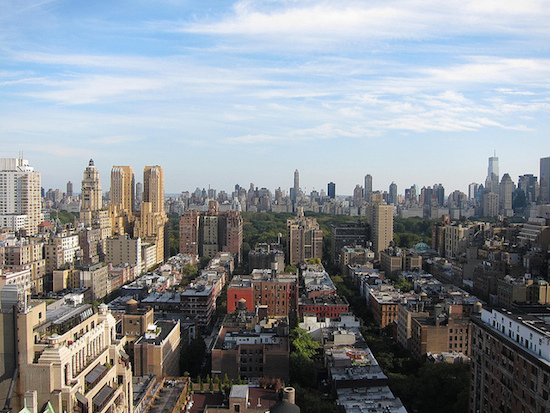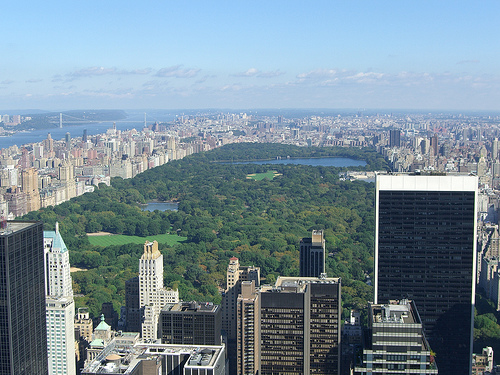
Pick an apartment, any apartment. Then get ready to pay up! Photo by Bosc D’Anjou.
It’s always a difficult decision whether to rent or buy an apartment, but one metric tracked by StreetEasy makes renting look increasingly attractive right now.
On the Upper West Side, the “tipping point,” or the amount of time it would take for buying a home to become more financially beneficial than renting, is now at 6.2 years, up from 3.2 years as of one year ago, according to Streeteasy. For Manhattan, the tipping point is 7.7 years. For all of New York City, it’s 5.6 years, a full year longer than it was one year ago. The national median is just two years.
Streeteasy attributes the shift in favor of renting to “rising mortgage rates, higher home prices and a softening in the rental market in many parts of New York City.”
Streeteasy explains more and lets you search different neighborhoods here. The site also explains the rationale behind the “tipping point”: “The decision to buy or rent is really a choice between two options: investing in an appreciating asset (a home), or freeing your money for other, potentially higher-yielding investments.”









Renting limits people to apartments they need. Ownership encourages investment in assets, as seen with many of the investors in our community that don’t live here, weakening the community.
You do realize that plenty of renters have assets in investments (sometimes quite extensive), yet they choose to continue not to own their NYC apartment.
Case in point the scores if not hundreds of rental households that own property “in the country” or elsewhere.
Then you have various other financial investments (stocks, bonds, etc….)both as retirement planning and or as income producing.
Long story short just because persons “rent” that does not automatically make them any less worthy. For your information some of our very best buildings full of the “one percent” are rentals. This includes properties along CPW, Fifth, Park and Madison avenues.
That is my situation that you describe. You confirm my Commemt.
Evidence?
The evidence is those foreign investors (many from China), who purchase apartments in our neighborhood but don’t live in them.
Instead they consider the apartment in our neighborhood to be a foreign investment, like having a safety deposit box, but in the sky.
C’mon – I know you can do better than that.
Evidence on how ownership of units is at a level where the community is weakened?
I’m not asking for you to report your emotions – let’s have some facts.
Each of your replies has included name-calling, insults, or sarcasm. Have you exhausted that persuasive approach?
Or is it not working anymore?
Well, it’s hard to come up with a good response to that persuasive,, thoughtful argument.
Absentee landlords and investment-only owners don’t commune.
k?
You have an impressive ability to miss the point.
You assume that I don’t know that some people buy apartments for investment purposes only.
Of course I know that.
I have specified your comment of “weakening the community”, which is purely based on your emotions. You continue to avoid responding to that, which suggests that you are, essentially, clueless.
OriginalMark,
You again reply that my Comment is emotion, this time because I did not supply “evidence” of people buying apartments for investment purposes only.
I am surprised to find that you are not aware of this situation, and expect that most posting here are; so do your own research to get informed.
So then give the evidence for which you claim.
Otherwise, it’s emotion.
This isn’t rocket science.
I am not reporting my emotions. That is another wrong Comment from you, that you should stop.
That is all good and great, and then there is reality.
A “decent” two bedroom apartment (doorman, 1,000 sqft, in good condition, in a good location,…) will run you between $1 million and $1.2 million, if not more.
On top of that, it will likely have $1,500 to $2,500 in monthly costs (taxes, maintenance, insurance,…).
There may also be some added expenses such as closing costs, work that needs to be done before moving in or shortly thereafter, as well as the potential for getting hit with an assessments if there is a need for a large project in the building.
If you happen to have $500,000 in the bank you could put down a 40 to 50% down payment, leaving you with a $500,000 to $700,000 mortgage, or about $3,550 to $3,750 a month in mortgage payments.
You would then have to add monthly tax, maintenance and insurance costs, which lets say total $2,000.
That would mean monthly costs would be $5,550 to $5,750 per month, before utilities and other costs.
So, even with a $500,000 down payment, you would be locking yourself into paying over $5,500 a month (before utilities), and run the risk of getting hit with assessments, having to pay for repairs and loosing money if you ever want to sell it (it’s a myth that you always sell a home for more than you paid for it – even before taking into consideration interest expenses).
I am not saying that buying a home is dumb idea. Not at all. But in NYC, with the prices / carrying costs / taxes…that we have today, I am just not sure it makes sense, regardless of the costs of renting.
Of course, aside from the economics of the whole thing, you also have other things like future needs. You may be single and then get married. You may have no kids and then have two kids. You may not care about schools at first and then care a lot. Your commute may be 15 minutes and then go to 45 minutes. Buying makes it harder to adapt to changing needs.
Confucious say: Man who is loose with his money will eventually lose it…
I don’t begrudge most of Tom lee’s points above, but I believe his estimate of condo or “maintence” fees (common charges), taxes, and insurance are way high. At lest for my building. Maybe it is different in new buildings.
All you have to do is look online (www.streateasy.com).
A 2 bedroom 1.5 bath apartment at 260 West End Avenue is listed for $1.395 million. Maintenance and real estate taxes are $3,220 per month.
A 2 bedroom 1 bath apartment at 201 West 70th Street is listed for $1.25 million with maintenance and real estate taxes of $1,700 per month.
Both are doorman buildings.
So estimating $2,000 for monthly for tax, maintenance and insurance costs is very realistic.
But you listed a coop…most new builds have the tax abatement, are condo and less maintenance. I do see your points, but long term investment is still beneficial. It’s the reason why parents are buying apts for their college-aged kids all over the UWS. The kids may move and go elsewhere to start a family, but then the parents have a pied-a-terre that is worth millions when they get to selling the property.
The one thing about property in NYC is that someone will always want to buy it especially when it’s in a desirable location. It does become more of a personal decision of what expenses you have and how much savings you have accrued. The idea of spending $54000 per year on rent just to know the rent will continue to rise bothers me (I never lucked out with a rent stabilized/control apt). I shared a massive 2bd/2bath pre-war apt with separate full kitchen and massive LR upstairs from San Domenico/now Marea on CPS – paid less than $2000 per month combined from the owner..back in the day no one wanted property around the old Coliseum and now that area around Lincoln Sq/CPS is $$$$. The RE investment will yield more long term.
Who cares if its a co-op or a condo or whatever!
You are still going to pay over $1M for a 2bed and pay over $2,000 a month in taxes and maintenance.
And you are still going to need to come up with hundreds of thousands of dollars for the downpayment and have likely pay upwards of $5,000 a month.
Just pray you don’t get a $20,000 assessment for new water pipes like we did a few years ago.
The mortgage interest and real property taxes are itemizable as deductions, serving to reduce income taxes.
That’s like saying, the more you spend, the more you save.’
Yes, but you can only claim those deductions if you itemize. Vast majority of Americans and this includes New Yorkers take the standard deduction. As such all those tax deductions for home buying and owing becomes moot.
https://www.nytimes.com/roomfordebate/2015/04/14/the-worst-tax-breaks/the-uselessness-of-the-mortgage-interest-deduction
If you are subject to AMT, then that is a whole other ball of wax.
https://streeteasy.com/talk/discussion/33144-amt-and-mortgage-interest-deduction
I guess I’m gifted because I sure don’t believe in luck. when I Reading in the daily news back in 1967 when mayor Lindsay was the mayor of New York City who started the “renovation act” to save the upper West side and was offering builders a 20 year tax rebatemeant intern first renters would be under a special stabilization rent control act… that means first renters rent would never go up as long as you live there. Now 50 years later I’m still paying the same rent I paid 50 years ago. My apartment duplex floir through right now would be $2.5 million today’s market. I only paid $150 a month with no maintenance I guess that’s call winning!!!!! I now pay my rent three years ahead of time can’t be bothered with paying monthly rubbish rent at 65 yo.
No, you were lucky. I don’t begrudge your luck, but you were lucky.
You, my friend, Are very lucky even though I know you don`t believe in luck. the factors that goes into you being lucky considering in regards to apartment are too many to mention here but one of them is that you and the building are still around.
A very interesting analysis. I find the cash flows of ownership breathtaking, but it still makes sense for some people. Others should wait. The market will eventually correct, especially with property taxes consuming ever increasing shares of the monthly maintenance. The city will surely kill the golden goose.
Don’t buy an apartment if you don’t meet the following three criteria: enough cash for at least a 30% down payment, monthly mortgage and maintenance costs no greater than 50% of monthly take home and enough Savings to cover six to 12 months running costs. Also, if you can’t afford a self amortizing mortgage, you can’t afford the apartment.
Finally, assessments aren’t such a bogeyman. Even large assessments usually work out to be only a few percentage points of the apartment’s value. Better to pony up for them instead of getting a loan and renting your repairs from a bank. Taking care of your building is like money in the bank.
This was such a great comment. Insightful, factual, well written. Love it!!
Thanks for doing the math…as well as all the practical considerations. This is the comment of someone who knows what they are talking about.
Buying in NYC has always been a long term investment. I have seen relatives make $$$$ off property they bought in Greenwich Village, UWS, CPW in the 1960-70s. Most of us are cash poor these days, but owning a home on the UWS guarantees a home in the end. Renting in a newer building with amenities averages 3500-5000 per month for a 1 bedroom. At the end of the day, I think it might be better to have had the investment. Now, if I only bought that 1 bedroom on Madison Square Park in the luxe highrise in the late 1990s…It was a $125K condo.
The decision to buy or rent is not limited to /financial/ calculations. Owning the property one lives-in allows one to enjoy far greater security and independence. When you rent, you are ultimately at the mercy of your landlord. Sure, there may be many legal protections in-place for tenants but when it comes down to it, what is to stop a landlord from simply declining to renew a tenant’s lease or agreeing to do so only at a hyper-increased, inflated rent that the tenant cannot possibly afford? Unless I’m missing something and unless one is lucky enough to be a rent-regulated tenant, the answer is basically “nothing”. And that’s without even considering the type of aggravation, frustration and even abuse that many tenants endure when it comes to obtaining adequate service and repairs. (And yes, I am well aware that /tenants/, as well, can often be negligent, unfair and abusive– both toward landlords as well as toward fellow tenants.)
Does the linked article make no mention of these considerations?
As for the cited financial calculations that favor rental, these would appear not to apply to anyone who intends and expects to reside in a new apartment for more than 7.7 years (/and/ whose situation in life is sufficiently stable that the odds are favorable for such long-term residency to prove viable).
So, in conclusion:
If one intends to dwell somewhere for more than 7.7 years and can reasonably /expect/ to be able to do so, then /buying/, for anyone who can afford to do so, would appear a far better choice. (Assuming, at least, that one can /find/ a property for sale that sufficiently meets one’s requirements and preferences. I can imagine cases where the property one really wants to move-into is only available as a rental.)
Am sorry but neither piece is very well informed, and leaves out so much information.
First and foremost there isn’t enough available housing to purchase on the UWS to make it remotely comparable to renting. What housing that is for sale is largely condo, co-op or townhouse/mansion.
On a cost per square foot basis those considering purchasing a home can do far better outside of the UWS; and have done so. Every other day or week brings this or that article in Sunday’s New York Times or elsewhere about this or that household (straight or gay) that has decamped for the suburbs.
The only reason to purchase a home remains the same as it was for our parents or grandparents; to raise a family and or to have something that you own. Everything else such as “investment” or whatever is gravy.
Large bulk of for sale housing stock on the UWS are co-ops. There a two bedroom will run about $2 million give or take. But first and foremost you are buying into a co-op and all that entails including dealing with the board.
You might get lucky and find a nice pre-war apartment that hasn’t been chopped up and or otherwise will work for a family of two adults and one or more children, plus the nanny and maybe a dog or two.
https://www.nytimes.com/real-estate/guide/manhattan/upper%20west%20side%20(72nd%20-%2096th%20street)
Good thing you included that parenthetical note.
Without it, one might have thought that the only households showcased in the articles you cited were of the traditional, heterosexual variety.
From the New York Times? Perish the thought.